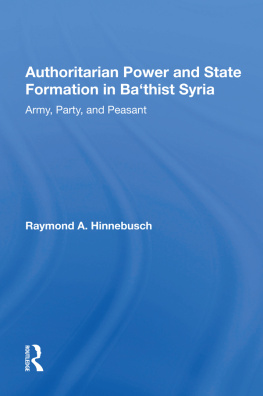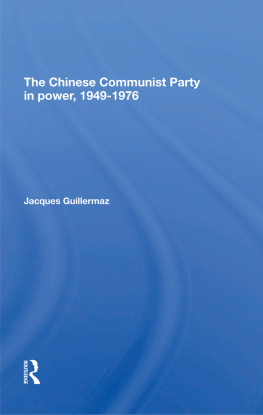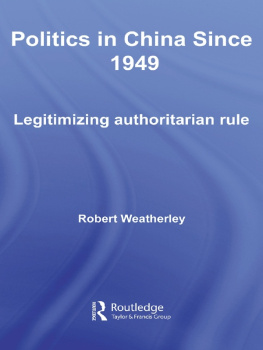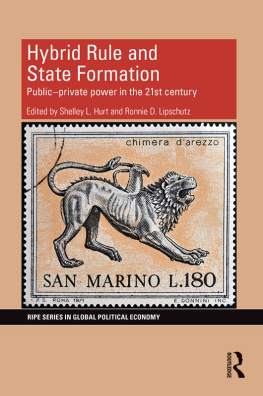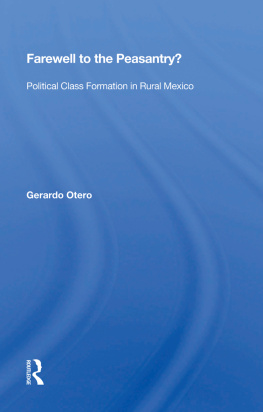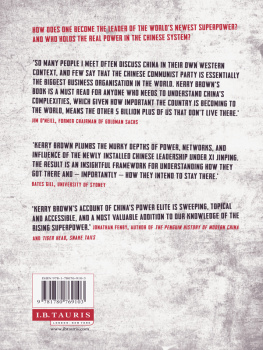Authoritarian Power and State Formation in Bathist Syria
First published in 1990 by Westview Press
Published in 2021 by Routledge
605 Third Avenue, New York, NY 10017
2 Park Square, Milton Park, Abingdon, Oxon OX14 4RN
Routledge is an imprint of the Taylor & Francis Group, an informa business
Copyright 1990 by Taylor & Francis
All rights reserved. No part of this book may be reprinted or reproduced or utilised in any form or by any electronic, mechanical, or other means, now known or hereafter invented, including photocopying and recording, or in any information storage or retrieval system, without permission in writing from the publishers.
Notice:
Product or corporate names may be trademarks or registered trademarks, and are used only for identification and explanation without intent to infringe.
Library of Congress Cataloging-in-Publication Data
Hinnebusch, Raymond A.
Authoritarian power and state formation in Bathist Syria : army,
party, and peasant / Raymond A. Hinnebusch.
p. cm. (Westview special studies on the Middle East)
Includes bibliographical references.
ISBN 0-8133-7590-8
1. Hizb al-Bath al-Arab Al-Ishtirk (Syria) 2. Syria
Politics and government. 3. Political socializationSyria.
4. Power. (Social sciences) I. Title. II. Series.
JQ1825.S873B31975 1990
320.95691dc20
89-29074CIP
ISBN 13: 978-0-3670-1265-6 (hbk)
ISBN 13: 978-0-3671-6252-8 (pbk)
DOI: 10.4324/9780429042515
To Tsunaki and Toshiko Ohyama and my wife, Nancy, for their invaluable support
Contents
2 Lord and Peasant in Traditional Syria: The Historical Roots of System Crisis
3 The Crisis of the Traditional Order: Social Change and Conflict
4 The Genesis of a Counterelite and the Struggle for Power
5 The Formation of the Bath Regime
6 The Pillars of State Power: Army, Party, and Bureaucracy
7 State-Society Linkage: The Case of the Peasant Union
8 State and Village: Rural Politics, Social Change, and Peasant Incorporation
9 Political Islam: Sectarian Conflict and Urban Opposition Under the Bath
10 Authoritarian-Populism and State Formation Under the Bath
- 2 Lord and Peasant in Traditional Syria: The Historical Roots of System Crisis
- 3 The Crisis of the Traditional Order: Social Change and Conflict
- 4 The Genesis of a Counterelite and the Struggle for Power
- 5 The Formation of the Bath Regime
- 6 The Pillars of State Power: Army, Party, and Bureaucracy
- 7 State-Society Linkage: The Case of the Peasant Union
- 8 State and Village: Rural Politics, Social Change, and Peasant Incorporation
- 9 Political Islam: Sectarian Conflict and Urban Opposition Under the Bath
- 10 Authoritarian-Populism and State Formation Under the Bath
Guide
Abbreviations
ABSPArab Bath Socialist PartyGFPGeneral Federation of Peasantsha.hectare (equivalent to 2.471 acres)IBRDInternational Bank for Reconstruction and DevelopmentL.S.Lira Suri, or Syrian Pound (worth about $0.11 in 1988)SARSyrian Arab Republic
Preface
This book examines the rise of the Syrian Bath Party and the subsequent formation of the Bathist state. It interprets the Syrian Bath regime as a case of a particular kind of political formation quite prevalent in the Arab world, namely, the authoritarian-populist state. It seeks to understand the forces that produce the populist orientation of these regimes and the processes and structures through which their authoritarian power is consolidated. Although the vast majority of work on Syria focuses on elite politics or foreign policy, this study stresses the centrality of the linkages between elite and society in understanding authoritarian-populism and state formation there.
The book explains the rise of the Bath as the product of the vulnerabilities of a fragile traditional order split by great urban-rural gaps and of the crises unleashed by Syrias incorporation into the world capitalist economy and state system; these processes set off the de-legitimation of the old regime, a deep-rooted agrarian crisis, the rise of class conflict, and the mobilization of anti-system forces, particularly from the village. The analysis shows how the Baths origins in a profound urban-rural conflict and its special road to power shaped its populist ideology and the authoritarian, but mass-incorporating, character of its rule.
The study also analyzes the struggles through which authoritarian power was concentrated and expanded. The formation of the Bath state is interpreted as the outcome of a dual strategy: (1) a revolution from above and the forging of Leninist political structures incorporating the rural population; and (2) the consolidation of a semi-patrimonial regime center through the emergence of a dominant leader who inserts kin and clientelist networks at the levers of coercive power. The outcome is a presidential monarchy presiding over three main institutions of rulethe Syrian army, the Bath Party, and the state bureaucracyand resting on a village base.
The story is carried a step further in a companion volume to this study, Peasant and Bureaucracy in Bathtst Syria: The Political Economy of Rural Development (Westview, 1989). That book examines agrarian policy under the Bath and the consequences of Bathist rule for socio-economic development in the villages from which the party came.
This study is based on a multitude of sources. Research in Syria, including elite interviews and village expeditions, was conducted in 19731974 and in the summers of 1977, 1979, 1982, 1985, and 1988. There is a small but important body of published primary sources, including Bath Party and government documents and personal accounts by insiders such as Razzaz, Safadi, Sayyid, and al-Jundi. A respectable corpus of scholarly literature has accumulated; some of it is by Syrian scholars, including economic analyses (Arudki), political and sociological studies (Hilan, Akhrass, Keilany, Jabbur, Allush, Hanna, Hamide), and village ethnographies (Ismail, Khalaf). I would like, in particular, to acknowledge the village study by Sulayman Najm Khalaf on which this book drew for its analysis of rural change in the Syrian East. The growing body of important works by Western scholars is indicated in the bibliography. I have tried to synthesize these disparate resources, organizing the data according to the concepts developed in the introductory chapter.
I thank the many Syrian officials, intellectuals, and friends who have helped make this book possible and the Fulbright Program and the Bush Foundation for financing the research.
Raymond A. Hinnebusch
1
Political Theory and the Syrian Bath Case
DOI: 10.4324/9780429042515-1
The Bath Partys 1963 seizure of power marked a major watershed in modern Syrian history: the collapse of the old regime which had inherited power in the first independent Syrian state and its replacement by a counter-elite which set out to forge an entirely new type of state and development strategy. Whether this amounted to a revolution as the Bathists insisted is a matter of controversy. The dominant views hold that it was a mere coup, although there is divergence on the nature of the post-1963 regime. Some hold that the Bath regime amounted to unstable praetorian military rule, others that it coalesced into neo-patrimonial rule by sectarian minorities. Some view the regime as a mere petit bourgeois nationalist reaction to imperialism which quickly evolved into a state bourgeoisie isolated from the masses. All these schools share the view that the regime, lacking political institutions capable of incorporating significant support, is narrow based and survives chiefly through repression; the mere creature of sectarian, military, or class elites, it is thought to have little advanced state formation in Syria.

